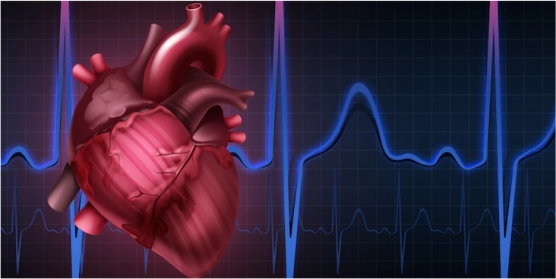Heart Arrhythmia
You can make a big difference with healthy lifestyle changes.

A heart arrhythmia is a condition in which heartbeats are irregular. These heartbeats show abnormal changes in the rhythm due to changes in the electrical signals in the heart. The faulty signals may cause the heart to either beat too fast (tachycardia) or too slow (bradycardia).
Patients with heart arrhythmia may feel like a racing heart which is usually harmless. Some fluttering of the heart, however, may cause life-threatening symptoms. While it is normal for you to have changes in heart rate over the day, it is not normal to have a speeding heart without any physical activity.
Heart arrhythmias can be treated with proper diagnosis and treatment. Early treatment is crucial to avoid dangers. Our excellent and professional team of cardiologists at Baderia Golden Heart Hospital provides incredible patient outcomes by applying novel cardiological diagnoses, procedures, and treatments to successfully treat arrhythmias.
Symptoms of Heart Arrhythmias
Initially, heart arrhythmias may not show any signs and symptoms. The doctor may observe the condition while examining you for other health conditions. The common symptoms which you should pay attention to are:
- Racing heartbeat.
- Slow heartbeat.
- Chest pain.
- Fluttering sensation in the chest.
- Shortness of breath.
- Dizziness.
- Sweating.
- Fainting.
- Anxiety.
Diagnosis of Heart Arrhythmia
We at Baderia Golden Heart Hospital have excellent diagnostic facilities which provide accurate cardiological diagnoses. Our state-of-the-art facilities along with the expertise of our doctors provide all-around treatment for patients with coronary artery disease.
Upon visiting our hospital, the doctors will conduct a thorough physical examination, study your previous medical history, and review your existing symptoms to take a course of action. In some cases, other health conditions such as previous heart disease or thyroid may cause arrhythmia. Hence, the doctor will study your condition thoroughly to analyze the root cause.
Following this, our doctor will run some additional tests to confirm the condition:​
- Electrocardiogram (ECG): This test will be conducted to evaluate the electrical activity in your heart. This test will show the timing and lengths of your heartbeats which indicates heart failure.
- Holter monitor: The doctor may even ask you to wear a portable ECG device called a holter monitor to record your heart’s activity throughout the day.
- Echocardiogram: This test produces images of the heart with the help of sound waves. The test shows the size and structure of the heart along with the blood flow.
- Event recorder: This is another portable ECG device which detects sporadic arrhythmias. The recorder can record events whenever symptoms appear.
- Implantable loop recorder: If your arrhythmia symptoms are not frequent, the doctor may implant a loop recorder under the skin in the chest area to record your heart’s electrical activity.
Surgery for Heart Arrhythmias
At Baderia Golden Heart Hospital, our main aim is to offer patients comfort and satisfaction. We curate the most suitable treatment strategy for our patients by studying their condition. Usually, the first line of treatment includes medications and lifestyle changes. Surgery is recommended if the medications and lifestyle changes are unable to improve the condition. The doctor may perform the following surgeries depending on your condition:
- Catheter Ablation:
In this procedure, the doctor will pass one or more catheters through your blood vessels to the heart. The electrodes attached at the tip of these catheters utilize heat or cold energy to create tiny scars in your heart. These scars block abnormal electrical signals and restore a normal heartbeat.
- Implantable Cardioverter-defibrillator (ICD):
If you are at a high risk of developing other heart conditions due to arrhythmias, the doctor will recommend this device. An ICD is implanted under the skin near the chest. One or more electrode coated wires from the device are connected to the veins reaching the heart. This monitors your heart rhythm continuously. If you experience an abnormal heart rhythm, the device sends low energy shocks to the heart to restore the normal rhythm.
- Pacemaker:
If you have slow heartbeats that cannot be corrected with medications and lifestyle changes, the doctor will recommend a pacemaker. A pacemaker is a device that is implanted near the chest. One or more electrode coated wires from the device are connected to blood vessels in the heart. If your heart rate slows down, the pacemaker sends electrical impulses to stimulate the heart and generate a normal beat.
- Coronary Artery Bypass Surgery (CABG):
Also called open-heart surgery. In this procedure, the heart surgeon will take a healthy blood vessel from another part of your body to create a new path for blood flow in the heart. This surgery is usually performed as an emergency procedure to narrow down the blocked arteries.
- Maze Procedure:
In this procedure, the heart surgeon will create several incisions in the heart tissues of the upper heart to create a pattern of the maze. As scar tissues cannot generate impulses, these will interfere with the electrical impulses causing the arrhythmia.


